
views
Studying With Sticky Notes

Mark your book. Sticky notes are great for marking pages or passages in a book you are studying. Just stick the note on the relevant page and maybe write a brief note or a few key words that indicate why you have marked this section. As well as the traditional square sticky notes, you can purchase slim and tall ones which work particularly well to mark pages in a book. These slimmer notes will mark the page without covering over much of the actual text. You can also tear the regular square notes into thinner strips and use these as markers. Sticky notes are great as a representation of what's important, especially when you restructure that information in your own words.
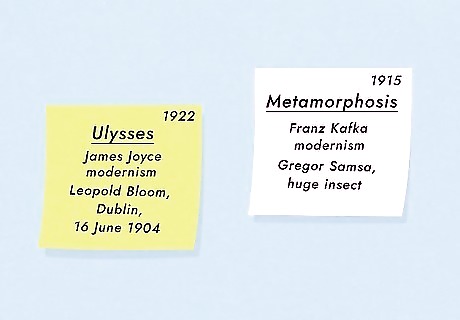
Make some notes. Sticky notes are a great way for you to make some brief notes on a topic you are studying or working on. Whereas you would make longer more detailed notes in a workbook, sticky notes are great for writing down key words or phrases that you want to learn. You can then stick them up on the wall around where you are working. You can organise the notes and move them around to help you visualise the information you are trying to learn. If you are studying for a history exam and want to learn a chronology of events, you can stick the notes in order and separate them by year or month. You can also use sticky notes to condense important paragraphs into your own language, which helps you summarize important information but also reteach the information to yourself. Writing up key vocabulary and sticking the notes up around your house, can be good way to practice a foreign language.
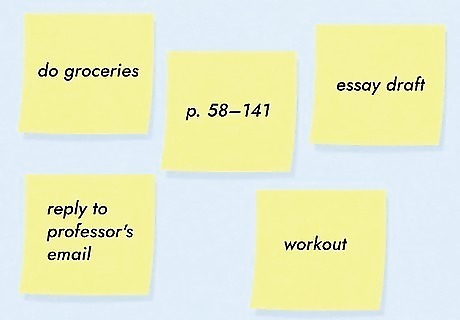
Write up a to-do list. If you have a long list of tasks to complete or things to study, sticky notes can be a useful way to organise your to-do list. You can write down a task on each sticky note, and then shift them up and down in the list according to your priorities and deadlines. Alternatively, you could group together similar or related tasks on one note, in order to better visualise what you have to do. If you have a to-do list of sticky notes on the wall, it will give you some satisfaction to pull down the note of a task when you have completed it. If you are using the notes for study, sticking them up above your desk is probably the best place. You could also stick them up somewhere prominent around your house, such as on your computer monitor, or on the fridge.
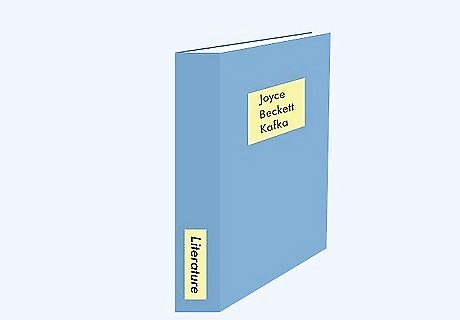
Label your folders. Use sticky notes to label your different folders and collections of notes to make it easier to find what you need when you are studying. You can trim down the sticky note so you are just using the slim adhesive-backed section, and write a brief title for the contents of the folder. You could stick the label on the side or spine of the folder to make it easier to find what you are looking for.
Using Sticky Notes to Get Organized
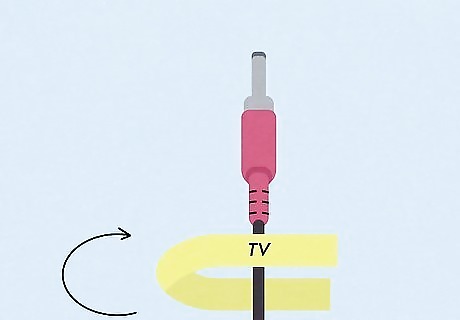
Label your cables. Sticky notes can be very helpful for organizing yourself and your house in a number of ways. If you find that you have developed a confusing tangle of cables behind your TV or computer, and it always takes some painstaking work to discover what cables is for what, sticky notes can help. Tear or cut the note down so you just have the adhesive strip left, and then write down the name of the appliance of each cable, “TV,” “DVD,” “Stereo,” etc. Then wrap the label around the appropriate cable, taking care to fasten it tightly in a ring around the wire.
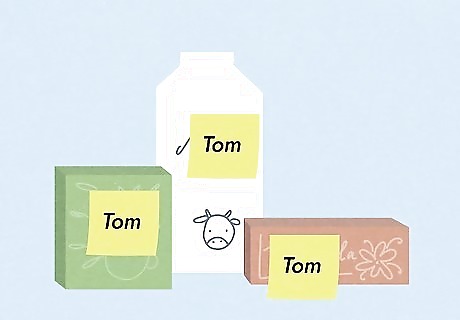
Mark your food. If you live in a shared house, you may want to label your food to make sure that none of your housemates eat it. Sticky notes are ideal for this as you can quickly and easily label your supplies just by writing your name on a note and attaching it to your eggs, milk, or anything else. Try to have some restraint when it comes to labelling food. Labelling absolutely everything can seem somewhat over the top. Consider just labelling a few key things that could easily be mistaken for somebody else’s.
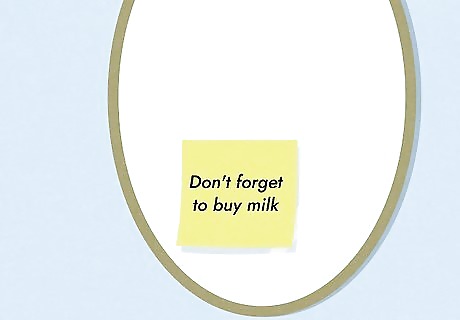
Leave messages and reminders. Sticky notes are a convenient and easy way to leave notes and reminders for people you live or work with. Write down a reminder to pick some milk on the way home from work, or that the electricity bill is overdue, and stick it somewhere prominent. Research has shown that people are actually more likely to respond to, and act on, a message or request made on a sticky note than communicated in some other ways. It is thought that sticky notes work so well because it is more personalised. It is also harder to ignore as it sticks out from its environment. Seeing a note stuck on the fridge may make you want to deal with it so you can take it down, and free the fridge door of mess and clutter. You can also use sticky notes as a reminder for studying by putting them someplace you know you'll be looking at often, like a laptop. They'll function as behavioral prompts you can't miss!
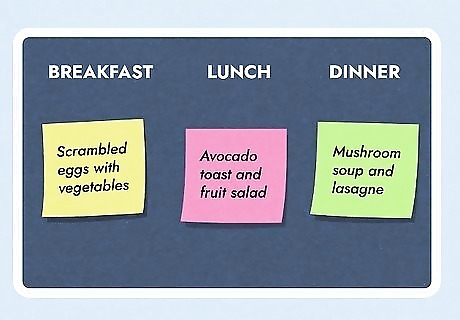
Make a colourful schedule or plan. You can use sticky notes to make a colourful, visually engaging, and flexible plan or schedule for everything from work, to study, to household chores. If you are making a schedule for everybody’s weekly chores, you can write up each chore on a note and arrange them in groups. Once a task has been completed, the person responsible can tear down the note. You can use notes to make meal plan so you know what you will be eating through the week. This could also help you to realise if you need to buy any ingredients. Using sticky notes to make schedules and plans allows you to move around the meals or tasks. You can easily reassign a task to somebody else, or change the meal plan.
Finding Alternative Uses for Sticky Notes
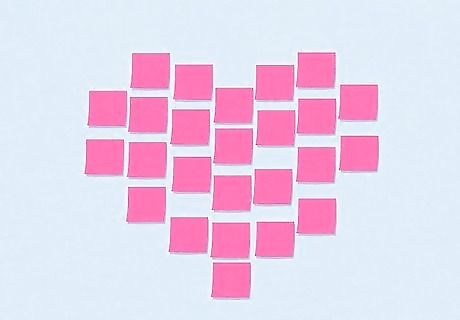
Make a mosaic. If you are feeling a bit more creative, you can use the brightly coloured sticky notes to make a mosaic on your wall. Think of each note as a tile, and experiment with different arrangements to create a striking mosaic. Sticky note mosaics are increasingly popular and there are examples of people spending months and using thousands of sticky notes to realise their vision. Try to plan out the mosaic you are going to make before you get started sticking things to the wall. Using squared paper and colouring in the squares could be a good way to try out some different designs on paper, before using actual sticky notes.
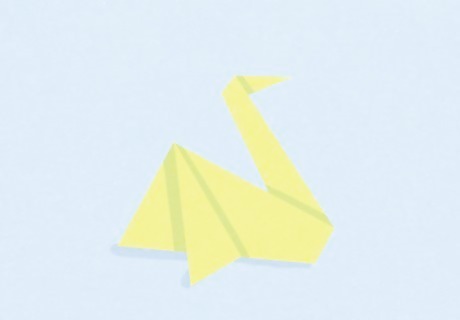
Try some origami. You can use your sticky notes as the raw materials for all kinds of 3D models and origami creations. Making models of your old notes can be fun way to re-use the notes and celebrate tasks you have completed. You could start off by making a simple hat, a pelican, a jumping frog, or a star. Look online for easy to follow folding instructions for all sorts of origami and 3D models. Remember that if you are just using one small sticky note, your options will be somewhat limited.
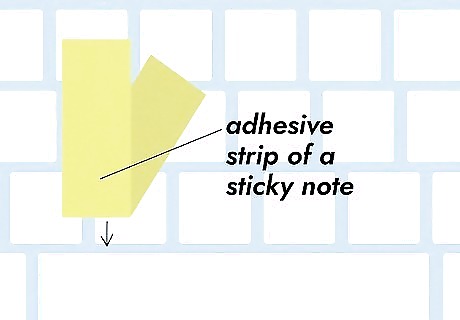
Clean your keyboard. An often overlooked use for sticky notes is as a handy cleaning device for your keyboard. Keyboards will often get little pieces of fluff and detritus stuck down in the spaces around the keys, and these can be hard to clean out easily and effectively. You can use the adhesive strip of a sticky note to clean these narrow spaces. Fold or tear the note so that the adhesive strip is on both sides, and then slide it into the space around the keys on your keyboard. This is painstaking but satisfying work, and you’ll be amazed how much dirt gets into your keyboard.
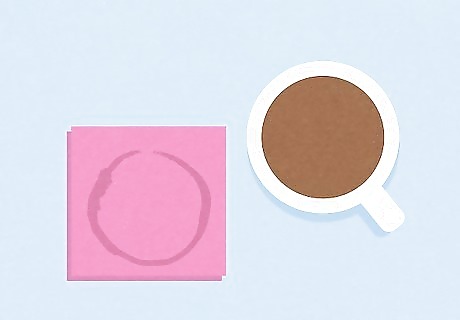
Use a note as a coaster. You can use a small stack of sticky notes as a makeshift coaster for a hot or cold drink, to help protect your furniture from any marks or stains. You will have to get a few sticky notes, rather than just one, to help ensure that the liquid from your drink doesn’t get through the coaster and onto your table. If you have sticky notes in a variety of colours available, favour those are not so brightly coloured. Avoiding neon or highly saturated colours reduced the chance of the colours running and staining your furniture.


















Comments
0 comment